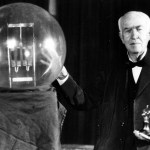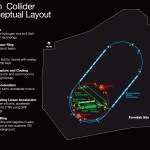Relativity
“If the imprint is really due to gravitational waves from the big bang, then this is the type of cosmological discovery that comes along perhaps once every fifty years.” -Kip Thorne
Now that LIGO's successfully detected it's first gravitational waves — from two merging black holes — we know that we will find them in a variety of circumstances if we look in the right way.
Illustration of a fast gamma-ray burst, previously only thought to occur from the merger of neutron stars. Image credit: ESO.
While LIGO and its successors will be great for exploring high-frequency events like small black…
"There was a long history of speculation that in quantum gravity, unlike Einstein's classical theory, it might be possible for the topology of spacetime to change." -Edward Witten
General relativity makes very specific prediction for what the curvature of space should be at the event horizon of a black hole, and for the consequences to spacetime are for a mass accelerating outside, near and through it. However, a fully quantum theory of gravity is needed to understand what happens at or near a black hole's singularity.
Image Credit: Caltech/MIT/LIGO Lab, of the first gravitational wave…
"Einstein's gravitational theory, which is said to be the greatest single achievement of theoretical physics, resulted in beautiful relations connecting gravitational phenomena with the geometry of space; this was an exciting idea." -Richard Feynman
When we look out into the Universe, we normally gain information about it by gathering light of various wavelengths. However, there are other possibilities for astronomy, including by looking for the neutrinos emitted by astrophysical sources -- first detected in the supernova explosion of 1987 -- and in the gravitational waves emitted by…
"Science, however, gives me the feeling of steady progress: I am convinced that theoretical physics is actual philosophy. It has revolutionized fundamental concepts, e.g., about space and time (relativity), about causality (quantum theory), and about substance and matter (atomistics), and it has taught us new methods of thinking (complementarity) which are applicable far beyond physics." -Max Born
The farther away we look in the Universe, the farther back in time we look as well, since light has a finite speed. But if a galaxy's light takes a million years to reach you, that galaxy is going…
"Learn from yesterday, live for today, hope for tomorrow. The important thing is not to stop questioning." -Albert Einstein
While it's easy to look on Einstein's general theory of relativity — which turns 100 today — as a revolutionary new way to interpret space and time, as well as their interplay with matter and energy, it actually came about due to a problem with the Solar System.
Image credit: NASA / JPL-Caltech / R. Hurt.
The orbits of all the planets, comets and asteroids were explained very nicely by Newtonian gravity, with the exception of Mercury, which precessed a little too…
"Gravitational and electromagnetic interactions are long-range interactions, meaning they act on objects no matter how far they are separated from each other." -Francois Englert
Want a recipe for seeing as far into the distant Universe as you can? Because of how distance and brightness are inversely related, you need to make the most of every photon, build as large a telescope as possible and observe for long periods of time in order to collect the most light.
Image credit: XMM-Newton, ESA, NASA.
But there's an extra bit of magnification that Einstein's General Relativity gives to us for…
“Everyone has his dream; I would like to live till dawn, but I know I have less than three hours left. It will be night, but no matter. Dying is simple. It does not take daylight. So be it: I will die by starlight.” -Victor Hugo
Whether you're at rest or in motion, you can be confident that -- from your point of view -- the laws of physics will behave exactly the same no matter how quickly you're moving. You can move slowly, quickly or not at all, up to the limits that the Universe imposes on you: the speed of light.
Image credit: Noreen of http://thecampgal.com/2014/06/17/flashlight-…
“To me there has never been a higher source of earthly honor or distinction than that connected with advances in science.” -Isaac Newton
If Newton truly meant that sentiment, perhaps he would have been happy to find out that his theory of gravitation -- which stood unchallenged for over 200 years -- was superseded a century ago by Einstein's general relativity. Not only did Einstein's theory reproduce all the successful predictions of Newtonian gravity, but where the predictions differed, Einstein's agreed with observations where Newton's did not.
Image credit: Wikimedia Commons user…
“The total number of people who understand relativistic time, even after eighty years since the advent of special relativity, is still much smaller than the number of people who believe in horoscopes.” -Yuval Ne’eman
It's been 13.8 billion years since the Big Bang for us, and when we look out at a distant object in the Universe, we're seeing it as it was in the past. Its age -- as it appears -- is determined only by how long the light took for it to travel from that object to our eyes, but to someone living there, it will also appear that the Universe is 13.8 billion years old.
Image credit…
When it comes to the definition of "genius," everything is relative, right? When a particularly bright young person performs an amazing feat of intellect or scores incredibly well on a standardized test like an IQ exam or the SAT, we often herald them with excessive praise, calling them "the next Einstein" or even "smarter than Einstein," as though scoring well on a test were justification for such treatment.
Image credit: Screenshot from Latinoshealth.com.
Yet not only did Einstein never take an IQ test, he loathed standardized testing, having very public feuds with Thomas Edison and…
“One feels that the past stays the way you left it, whereas the present is in constant movement; it’s unstable all around you.” -Tom Stoppard
You might best know Einstein for E=mc^2, but I would argue that the far greater contribution was the development of relativity. Think about the following: if you strike the upper atmosphere with a cosmic ray, you produce a whole host of particles, including muons. Despite having a mean lifetime of just 2.2 microseconds, and the speed of light being 300,000 km/s, those muons can reach the ground!
Image credit: Pierre Auger Observatory, via http://…
“Oh leave the Wise our measures to collate. One thing at least is certain, light has weight. One thing is certain and the rest debate. Light rays, when near the Sun, do not go straight.” -Arthur Eddington
While we know full well today that Newtonian gravity is just an approximation to a more correct theory of gravity, you've got to remember that for over 200 years, it was unchallenged as the science that explained the entire Universe. When a simple puzzle -- the orbital mechanics of just one of the planets -- failed to line up with its predictions, it was assumed there was a problem…
It's one of the cardinal laws of physics and the underlying principle of Einstein's relativity itself: the fact that there's a universal speed limit to the motion of anything through space and time, the speed of light, or c. Light itself will always move at this speed (as well as certain other phenomena, like the force of gravity), while anything with mass -- like all known particles of matter and antimatter -- will always move slower than that.
Image credit: Matt Howard.
But if you want something to travel faster-than-light, you aren't, as you might think, relegated to the realm…
“Nobody ever did, or ever will, escape the consequences of his choices.” -Alfred A. Montapert
You might not think of falling into a black hole as a choice, but in the case of this week's Ask Ethan, someone is choosing to explore exactly that!
Image credit: original unknown, retrieved from http://mondolithic.com/.
Imagine, if you will, taking a solid object that's completely outside of an event horizon, of choosing a very massive black hole with minuscule tidal forces at that location in space, and then just barely pushing a tiny piece of that object over to the other side of…
“If everything seems under control, you’re not going fast enough.” -Mario Andretti
One of the toughest things to wrap your mind around in the natural world is the idea of special relativity: the faster you move, the closer you get to the speed of light, the more difficult it becomes to increase your speed at all. While you might approach the speed of light arbitrarily and asymptotically, you'll never reach it.
Image credit: user Fx-1988 of deviantART.
And yet, we have the Universe, expanding all the time, where the expansion rate itself is even speeding up. You might wonder, then, if these…
Imagine that you've got that absolutely weightless feeling, the kind you get when you lose your balance and hurtle towards the ground. Are you on a roller coaster? Did you fall out of an airplane? Or are you in an accelerating elevator?
Image credit: Dutch Experiment Support Center, via http://www.descsite.nl/Gravity_us.htm.
According to Einstein's Equivalence Principle, there's really no way for you to tell, not unless you've got some view of the outside world. What you might not realize is that there's an assumption at play here: that the kind of mass you experience due to gravitation…
Imagine the surface of the Moon, so distant, and an infinitely precise and powerful laser pointer. With a flick of your wrist, you can send the dot that you see flying across the Moon's surface as quickly as you can manage.
Image credit: Sabine Hossenfelder.
Without too much difficulty, in fact, you'll find yourself breaking the speed of light! Not in terms of violating special relativity or anything, but if you follow the motion of the dot, you'll not only find that it appears to move faster than the speed of light in a vacuum, c, but that its behavior is more interesting -- and more…
“It followed from the special theory of relativity that mass and energy are both but different manifestations of the same thing — a somewhat unfamiliar conception for the average mind.” -Albert Einstein
On the one hand, we have matter -- things with mass -- in the Universe, ranging all the way from planets, stars and galaxies on the largest scales to molecules, atoms and fundamental particles on the smallest.
Image credit: Jenny Mottar.
But then, on the other hand, there are particles without mass at all: photons, for example. They still carry energy and momentum, but of all the…
“We like to admit to only that which already glows, although it is nobler to support brightness before it glows, not afterwards.” -Dejan Stojanovic
When we look back to greater and greater distances in the Universe, we're looking back to earlier and earlier times as well. At some point, we can see far enough back that we reach the location at which the Universe cooled enough to first form stable, neutral atoms.
Image credit: NASA / CXC / M.Weiss.
But this is no nearby location: it's presently located some 45.3 billion light-years away! All the stars, galaxies, clusters and gas clouds that…
“Henceforth space by itself, and time by itself, are doomed to fade away into mere shadows, and only a kind of union of the two will preserve an independent reality.” -Hermann Minkowski
When you think of waves, chances are you think of some type of pressure wave moving through a medium, like sound or water waves, or you think of light, which is an electromagnetic wave that requires no medium to move through. But there's another type of wave that exists, that no one expected before Einstein came along: gravitational waves.
Image credit: Wikimedia Commons user MOBle.
It's very…


















